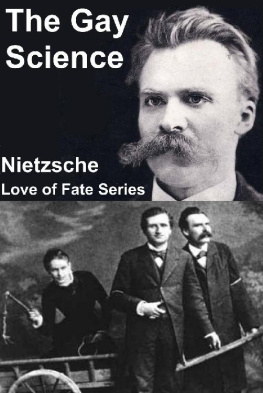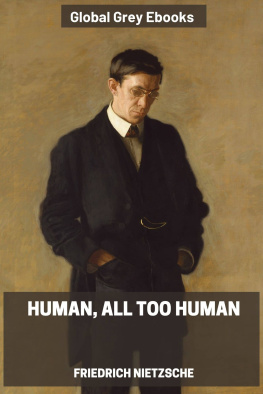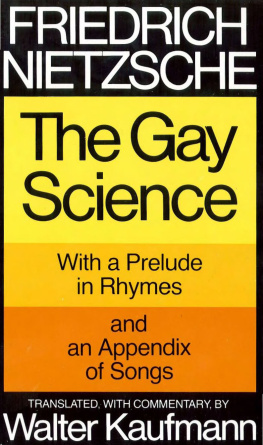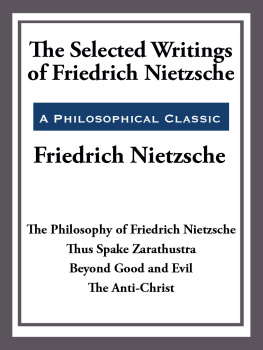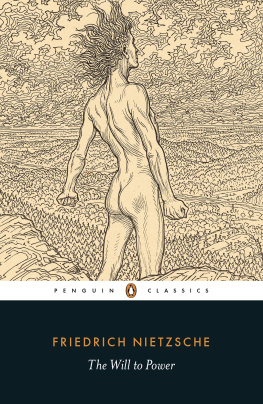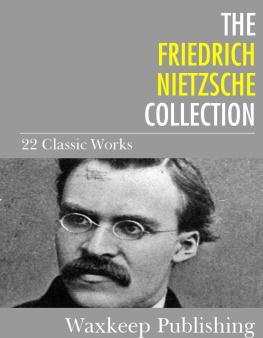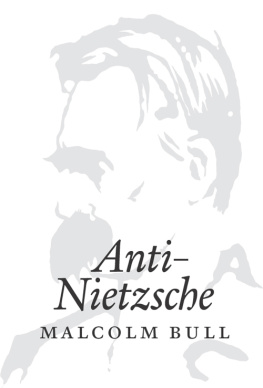THE GAY SCIENCE
By Friedrich Nietzsche
Translated by Thomas Common
Edited by Bill Chapko
CONTENTS
Appendices
EDITOR NOTES
Nietzsche Love of Fate Series
Version 4.67 - March 1, 2010.
William A. Chapko, 2010
The eight digital books in the "Nietzsche Love of Fate Series" can be bought singly or, for a slightly higher price, as a complete collection (2.1 MB download). All books are unabridged.The contents of these ebooks, including the introductions, appendices and hyperlink format, may not be used for commercial purposes without permission from Bill Chapko.
Note on the Translations
Based on early 1900's public domain translations, these eight books have been somewhat modified (especially Zarathustra). Words no longer commonly used, such as fain , hitherto , thee , wouldst , therefrom , nigh , ye and forsooth , have been replaced with their modern English equivalents.The eight books are: The Gay Science .....Modified digital version based on the translation in the public domain by Thomas Common. Ecce Homo ........Modified digital version based on the translation in the public domain by Anthony M. Ludovici Zarathustra .......Extensively Modified digital version based on the translation in the public domain by Thomas Common. The Dawn ........ Modified digital version based on the translation in the public domain by J. M. Kennedy Twilight of the Idols ..Modified digital version based on the translation in the public domain by Thomas Common The Antichrist ..... Modified digital version based on the translation in the public domain by H.L. Mencken Beyond Good and Evil .. Modified digital version based on the translation in the public domain by Helen Zimmern Genealogy of Morals ...Modified digital version based on the translation in the public domain by Horace B. Samuel
Ebook Cover Photos
The bottom photo on the ebook cover shows Nietzsche joking with his friends, Miss Lou Salom (left) and Paul Ree (center). The taking and arrangement of the photo were at Nietzsche's suggestion. The top photo was taken at age 31.
Note On The Selection Of Books
The Nietzsche Love of Fate Series contains the full texts of Nietzsche's eight best and most mature works. The books written before The Dawn (1880) are not as mature as those written later. The Case of Wagner (1888) and Nietzsche Contro Wagner (1888) are too narrow in scope.The famous book, The Will to Power (1901) is a collection of tentative notes edited, arranged and published by Nietzsche's sister after his death. It's value is surrounded by a great deal of controversy among scholars. The eminent Nietzsche scholar Mazzino Montinari went so far as to call it a "forgery". As Walter Kaufmann said in his introduction to the book, Nietzsche could have included these notes in his published works but he chose not to and therefore it is possible he was not fully satisfied with them. For these reasons the book is not included among his "best 8".
Eternal Recurrence
To the Reader,In his autobiography Nietzsche said that Zarathustra was by far his most inspired and most important book, and that the "basic conception of this work" was the idea of "eternal recurrence". This idea is intimately involved with what he calls "love of fate", "that one wants nothing to be different, not forward, not backward, not in all eternity."The idea of eternal recurrence, so strange and yet so simple, needs to be considered more than it has been. I have taken the liberty of including my essay on eternal recurrence in the appendices of this ebook. You may read it here: Bill Chapko
Editor Profile
Born in 1947, Bill Chapko grew up in suburban New Jersey. At New York University he studied Existential Philosophy under Professor William Barrett, author of the book "Irrational Man: A Study in Existential Philosophy". He graduated with a BA in Philosophy in 1969. He has read, enjoyed and studied Nietzsche all his life.Since 1981 he, his American wife Eva and their four children, have lived happily in southern Italy.
INTRODUCTION TO NIETZSCHE'S LIFE AND WRITINGS
by Bill Chapko
University philosophers, especially from America and England, have always been bewildered and irritated by Nietzsche. He doesn't fit anywhere. His influence has been outside university culture - among artists, dancers, poets, writers, novelists, psychologists, playwrights. Some of the most famous who publicly acknowledged being strongly influenced by Nietzsche were Picasso, Isadora Duncan, Martha Graham, William Butler Yeats, Rainer Rilke, Allen Ginsberg, Khalil Gibran, Martin Buber, H.L. Mencken, Emma Goldman, Jacques Derrida, Michel Foucault, Thomas Mann, Hermann Hesse, Jack London, Franz Kafka, Jean-Paul Sartre, Albert Camus, Sigmund Freud, Carl Jung, Karl Jaspers, Alfred Adler, Fritz Perls, Eugene O'Neill and George Bernard Shaw.There is a large amount of scholarly literature attempting to "explain" and systematize Nietzsche and his thought. Professors comb through the events of his rather ordinary life to find reasons or a pattern to his radical ideas. Books and articles about his writings strain to fit him neatly into some framework of western philosophy. I am assuming that Nietzsche gave birth to something radically new, outside of western philosophy - that he was defending a new type of philosopher yearning to explore outside "systems of thought". "I mistrust all systematizers and I avoid them. The will to a system is a lack of integrity."
Twilight of the Idols , (part 2, sec 26)Explore Nietzsche yourself. He mostly wrote directly and clearly, without scholarly jargon. See if he brings out the artist or psychologist or dancer in you.
Summary of Nietzsche's Life
Other than a lifelong painful debilitating illness and his temporary friendship with the famous composer Richard Wagner, Nietzsche's life was rather ordinary. His family was not rich, so he had to work for a living as a philology professor. He hated the drudgery of teaching and scholarship and his spirit led him to write books that were almost universally unpopular among his peers. At first they viciously criticized his ideas and style and then completely ignored him. He nevertheless maintained good relations with his university employers and after ten years was released from work for reasons of health with a pension of 2/3 his salary. He wandered and wrote for the rest of his lucid life. His friendship with Wagner soured for various reasons. He loved a fascinating girl, Lou Salome, who was younger than him and wanted to remain free. He was close to his sister until she poisoned his friendship with Lou and later married an anti-Semite rabble-rouser. His loyal helper Peter Gast during these years unfortunately was not the missing friend he needed to stimulate his thought and spirit. In his last lucid year, he finally sensed fame approaching through the enthusiastic recognition and praise of the influential Danish writer Georg Brandes. Nietzsche wrote an autobiography in anticipation and while finishing it he went insane for reasons that are not clear.For more details of his life go to:
Nietzsche's Writings
Aphoristic Writing
Most of Nietzsche's books after 1876 contain only aphorisms, varying in length from one short sentence to several paragraphs, each dealing with one subject, idea or observation. Aphorisms following each other are sometimes related, sometimes not. Each aphorism can stand by itself. This is especially true of Human All Too Human, The Dawn, The Gay Science and Zarathustra but even Beyond Good and Evil, Twilight of the Idols and The Antichrist follow this form to a great extent. These aphorisms return unsystematically to the many subjects and themes seen throughout his books. Each book does not have a single theme and you could see them all as one big bag of uncategorized aphorisms. Even the two later books that concentrate on a single theme, the Genealogy of Morals and Ecce Homo are punctuated throughout with striking aphorisms. The pre-Socratic philosophers also used disjointed aphorisms to describe the universe. Aristotle was the first to describe the world in a systematic way and this became the norm for philosophers ever since. It is Nietzsche's return to the uncategorized aphorism that is so unique, disturbing and powerful.

